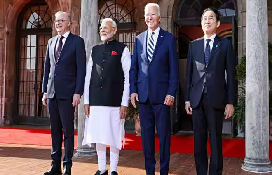India has signed three Key agreements under the Indo-Pacific Economic Framework (IPEF) during Prime Minister Narendra Modi’s visit to Delaware, USA. These agreements, focusing on the pillars of Clean Economy, Fair Economy, and an overarching IPEF administrative framework, were finalized on Saturday in the presence of the Prime Minister, who is on a three-day trip to the US for the Quad Summit, according to a statement from the Commerce Ministry.
Framework of IPEF
Launched on May 23, 2022, in Tokyo, the IPEF is an initiative aimed at enhancing economic cooperation and engagement among its 14 member countries. The framework is structured around four key pillars: Trade (Pillar I), Supply Chain Resilience (Pillar II), Clean Economy (Pillar III), and Fair Economy (Pillar IV). India’s recent signing builds upon its earlier ratification of the Supply Chain Resilience agreement (Pillar II) in February 2024. With this, India remains an observer in Pillar I but is now fully engaged in the Clean and Fair Economy agreements.
Clean Economy Agreement
According to the Commerce Ministry, the Clean Economy agreement, a major component of India’s IPEF commitments, seeks to foster technical cooperation, capacity building, workforce development, and research collaborations. The goal is to accelerate clean energy transitions, enhance climate resilience, and reduce greenhouse gas (GHG) emissions among IPEF partners. This agreement also facilitates investments and project financing, including concessional financing for joint collaborative projects, particularly targeting micro, small, and medium-sized enterprises (MSMEs).
The agreement will help integrate Indian companies into global value chains, especially in the Indo-Pacific region. Activities under this framework will include Cooperative Work Programmes, an IPEF Catalytic Capital Fund, and the IPEF Accelerator to catalyze clean energy investments.
Fair Economy Agreement
India also signed the Fair Economy agreement, which aims to create a more transparent and predictable trade and investment environment across the Indo-Pacific. The agreement promotes collaboration to combat corruption, enhance tax transparency, and improve tax administration across member states.
This pact focuses on strengthening cross-border investigations, facilitating asset recovery, and sharing information to fight bribery, money laundering, and terror financing. The Commerce Ministry highlighted that the agreement supports India’s ongoing efforts in these areas, including domestic resource mobilization. The agreement also emphasizes the importance of technical assistance and capacity building (TACB) initiatives to bolster anti-corruption measures and improve tax systems.
Overarching IPEF Agreement
An additional overarching agreement was signed to establish a high-level political oversight mechanism at the ministerial level. This agreement aims to ensure the effective implementation of various IPEF commitments by providing general guidance and establishing forums for ongoing ministerial discussions on emerging issues. The agreement is expected to help India enhance its productive capacity, integrate further into global supply chains, and encourage innovation, aligning with the country’s vision of Atmanirbhar Bharat (self-reliant India).
Furthermore, the inaugural IPEF Investor Forum, held in Singapore in June 2024, identified priority infrastructure projects worth USD 23 billion, with India accounting for USD 4 billion of potential investments in renewable energy companies. Additionally, the United States International Development Finance Corporation (DFC) committed USD 1.5 billion to support India’s energy transition, climate investments, and digital inclusion efforts.



